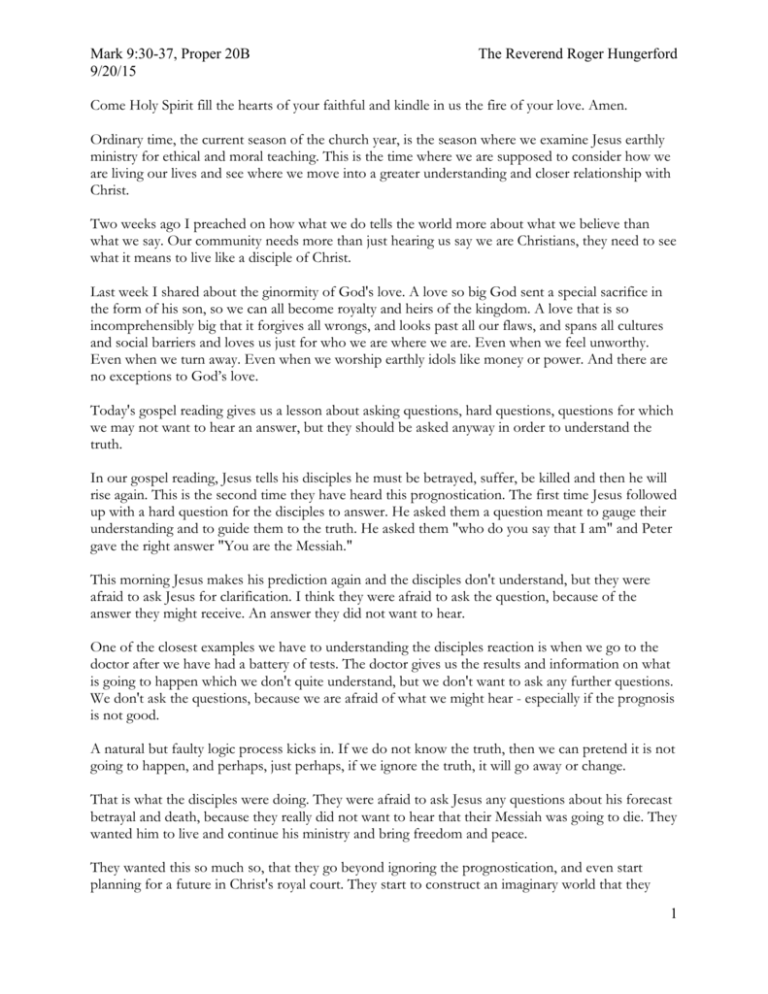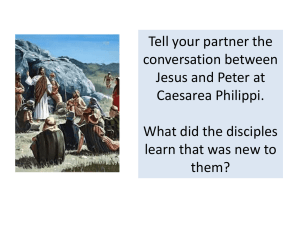Mark 9 (30-37), Proper 20B
advertisement

Mark 9:30-37, Proper 20B 9/20/15 The Reverend Roger Hungerford Come Holy Spirit fill the hearts of your faithful and kindle in us the fire of your love. Amen. Ordinary time, the current season of the church year, is the season where we examine Jesus earthly ministry for ethical and moral teaching. This is the time where we are supposed to consider how we are living our lives and see where we move into a greater understanding and closer relationship with Christ. Two weeks ago I preached on how what we do tells the world more about what we believe than what we say. Our community needs more than just hearing us say we are Christians, they need to see what it means to live like a disciple of Christ. Last week I shared about the ginormity of God's love. A love so big God sent a special sacrifice in the form of his son, so we can all become royalty and heirs of the kingdom. A love that is so incomprehensibly big that it forgives all wrongs, and looks past all our flaws, and spans all cultures and social barriers and loves us just for who we are where we are. Even when we feel unworthy. Even when we turn away. Even when we worship earthly idols like money or power. And there are no exceptions to God’s love. Today's gospel reading gives us a lesson about asking questions, hard questions, questions for which we may not want to hear an answer, but they should be asked anyway in order to understand the truth. In our gospel reading, Jesus tells his disciples he must be betrayed, suffer, be killed and then he will rise again. This is the second time they have heard this prognostication. The first time Jesus followed up with a hard question for the disciples to answer. He asked them a question meant to gauge their understanding and to guide them to the truth. He asked them "who do you say that I am" and Peter gave the right answer "You are the Messiah." This morning Jesus makes his prediction again and the disciples don't understand, but they were afraid to ask Jesus for clarification. I think they were afraid to ask the question, because of the answer they might receive. An answer they did not want to hear. One of the closest examples we have to understanding the disciples reaction is when we go to the doctor after we have had a battery of tests. The doctor gives us the results and information on what is going to happen which we don't quite understand, but we don't want to ask any further questions. We don't ask the questions, because we are afraid of what we might hear - especially if the prognosis is not good. A natural but faulty logic process kicks in. If we do not know the truth, then we can pretend it is not going to happen, and perhaps, just perhaps, if we ignore the truth, it will go away or change. That is what the disciples were doing. They were afraid to ask Jesus any questions about his forecast betrayal and death, because they really did not want to hear that their Messiah was going to die. They wanted him to live and continue his ministry and bring freedom and peace. They wanted this so much so, that they go beyond ignoring the prognostication, and even start planning for a future in Christ's royal court. They start to construct an imaginary world that they 1 Mark 9:30-37, Proper 20B 9/20/15 The Reverend Roger Hungerford want. They start to argue about who is the greatest. I imagine they were arguing about who Jesus loved and favored the most, or who had made the most impact as a disciple, or who was doing the best and most important work helping Jesus with his ministry. What they were doing was posturing among themselves for this new future roll they hope they would play. Isn't that what we do when confronted with future harsh reality, we start by ignoring it, then we construct the reality we want and try our best to will it into being, but that never works. Jesus knew what was going on so when they arrive at their destination in Capernaum and were sitting around relaxing, he asked them "What were you arguing about as we walked along?" Then the disciples have their "uh oh" moment realizing they have been caught. They were silent because they were embarrassed by how silly their discussion now seemed. But Jesus' purpose was not to embarrass them. Notice how Jesus does not chide the disciples when they do not respond to his question. His question was the way he gently guided them back to face the truth. Jesus then teaches the disciples by embracing a child and telling the them to welcome children. Welcome their inquisitiveness. Welcome their honesty. Welcome their questions. That was the kind of attitude Jesus was encouraging the disciples to nurture. That is the attitude we need to nurture, because it is through inquisitiveness, honesty and questioning that we will be guided to the truth. And it is in the midst of that truth, no matter how hard it is to accept, where we will find Jesus ready to guide us. Amen. 2









